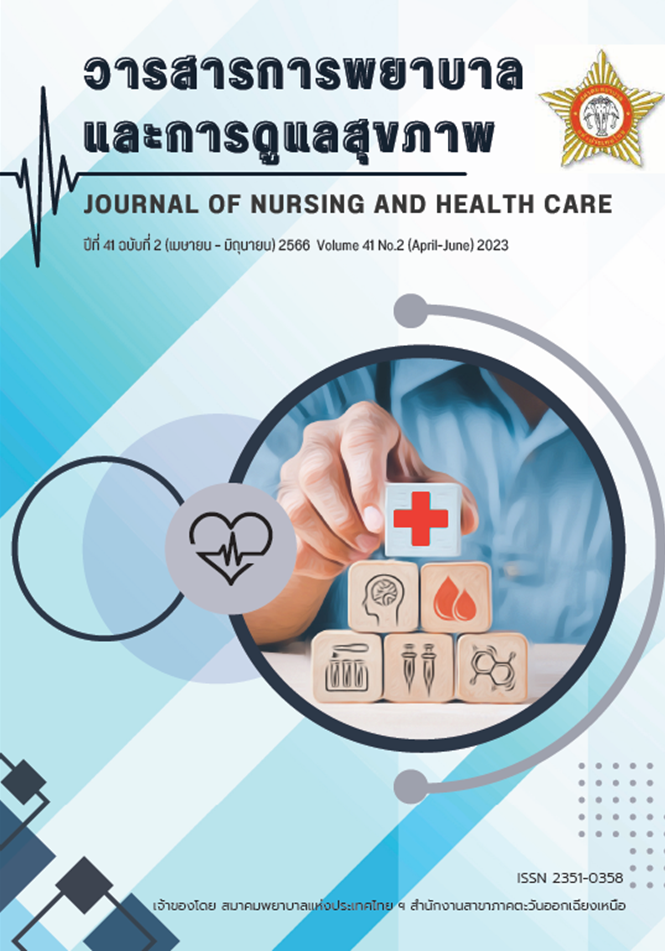ทัศนคติของนักศึกษาพยาบาลต่อการใช้เทคโนโลยีช่วยการเจริญพันธุ์ ที่ต้องรับการช่วยเหลือจากบุคคลที่สาม
คำสำคัญ:
การมีบุตรยาก, การใช้เทคโนโลยีช่วยการเจริญพันธุ์, นักศึกษาพยาบาล, ทัศนคติบทคัดย่อ
การวิจัยเชิงพรรณนาครั้งนี้มีวัตถุประสงค์ เพื่อศึกษาการรับรู้ของนักศึกษาพยาบาลเกี่ยวกับการศึกษาและทัศนคติต่อการใช้เทคโนโลยีช่วยการเจริญพันธุ์ และเปรียบเทียบทัศนคติของนักศึกษาที่มีปัจจัยส่วนบุคคลต่างกัน กลุ่มตัวอย่างคือ นักศึกษาพยาบาลชั้นปีที่ 3 และ ชั้นปีที่ 4 จากสถาบันการศึกษาพยาบาลสังกัดรัฐบาลและเอกชน 4 แห่ง รวมจำนวน 816 คน ซึ่งได้จากการสุ่มตัวอย่างอย่างง่าย เก็บรวมรวมข้อมูลโดยให้กลุ่มตัวอย่างตอบแบบสอบถามด้วยตัวเอง ประกอบด้วย แบบสอบถามเกี่ยวกับข้อมูล ส่วนบุคคล การศึกษาเกี่ยวกับการใช้เทคโนโลยีช่วยการเจริญพันธุ์ ความคิดเห็นต่อเนื้อหาหลักสูตร และทัศนคติต่อการใช้เทคโนโลยีช่วยการเจริญพันธุ์ แบบสอบถามมีค่าสัมประสิทธิ์แอลฟาระหว่าง .74 - .87 วิเคราะห์ข้อมูลโดยใช้สถิติพรรณนาการทดสอบค่าทีและการวิเคราะห์ความแปรปรวนทางเดียว
ผลการวิจัย พบว่า นักศึกษาส่วนใหญ่ (ร้อยละ 63.1) รับรู้ว่าเคยศึกษาเกี่ยวกับการใช้เทคโนโลยีช่วยการเจริญพันธุ์มากกว่า 2 ใน 3 ของนักศึกษา เห็นว่าเนื้อหาการรักษาภาวะการมีบุตรยากและการพยาบาลเกี่ยวกับการใช้เทคโนโลยีช่วยการเจริญพันธุ์และจริยธรรมมีความจำเป็นมากขึ้น นักศึกษามีทัศนคติทางบวกเกี่ยวกับสิทธิการมีบุตรว่าเป็นสิทธิ์ของผู้หญิงและของผู้ชายแต่มีทัศนคติทางลบกับการรักษาผู้หญิง/ผู้ชายที่มีภาวะมีบุตรยากที่ต้องรับการช่วยเหลือจากบุคคลที่สาม เช่น ผู้บริจาคอสุจิหรือไข่ นักศึกษาชั้นปีที่ 4 มีคะแนนทัศนคติโดยรวมมากกว่านักศึกษาชั้นปีที่ 3 อย่างมีนัยสำคัญทางสถิติที่ระดับ .05 และไม่พบ ความแตกต่างของทัศนคติระหว่างนักศึกษาที่มีประวัติการมีบุตรยากในครอบครัวและประวัติการใช้เทคโนโลยีช่วยการเจริญพันธุ์ในครอบครัวรวมทั้งการจะใช้เทคโนโลยีช่วยการเจริญพันธุ์ในอนาคต (p > .05)
Downloads
เอกสารอ้างอิง
Chamroonsawasdi K, Chairak P. A mid-term evaluation of the Second National Reproductive Health Policy and Strategies (2560 - 2569 B.E.) to promote quality of birth and growth. 2021. Department of Health. Ministry of Public Health. [cited 2022 Dec 10]. Available from: https://rh.anamai.moph.go.th/th/download-03/download?id=80427&mid=31985&mkey=m_document&lang=th&did=25574 (In Thai)
National Statistic Office. Number of total livebirths and livebirths in hospital and percentage of livebirths in hospital per total livebirths by region and province: 2012 – 2021. [cited 2023 Jan 20]. Available from: http://statbbi.nso.go.th/staticreport/page/sector/th/01.aspx (In Thai)
Zegers-Hochschild F, Adamson GD, de Mouzon J, Ishihara O, Mansour R, Nygren K, et al. International Committee for Monitoring Assisted Reproductive Technology (ICMART) and the World Health Organization (WHO) revised glossary of ART terminology, Fertil Steril 2009;92(5):1520-4.
Ombelet W. WHO fact sheet on infertility gives hope to millions of infertile couples worldwide. Facts Views Vis Obgyn 2020;12(4):249-51.
United Nations Population Fund, Office of the National Economic and Social Development Council. Thai population situation report 2016 [Internet]. Bangkok: United Nations Population Fund (UNFPA); 2015 [cited 2021 Apr 15]. Available from: https:// thailand.unfpa.org/site/default/files/pub-pdf/State%20of%20Thailand%20Population% 20report%202015-Thai%20Family_th.pdf. (in Thai)
The Lancet Global Health. Infertility-why the silence? Lancet Glob Health 2022;10(6):e773.
Nik Hazlina NH, Norhayati MN, Shaiful Bahari I, Nik Muhammad Arif NA. Worldwide prevalence, risk factors and psychological impact of infertility among women: A systematic review and meta-analysis. BMJ Open 2022;12(3):1-7.
Pangzup S, Ratinthorn A, Kasak R, Kasak P. The experience of women with infertility: A synthesis of qualitative study. Nurs Sci J Thai 2021;39(3):1-16. (In Thai)
The Medical Council of Thailand. Standard services of assisted reproductive techniques services. [Internet]. [cited 2022 Feb 8]. Available from: https://www.tmc.or.th/download/1_40.pdf (In Thai)
Satirapod C, Choktanasiri W. Basic to advance infertility treatment. Rama Med J 2017;40(4):49-58. (in Thai)
Tsonis O, Gkrozou F, Siafaka V, Paschopoulos M. The role of a midwife in assisted reproductive units. Clin Obstet Gynecol Reprod Med 2019;5(6):1-4.
Noide D, Anusanti S, Bankaert, P. The study of nursing outcome indicators of female infertility assisted reproductive. The Journal of The Royal Thai Army Nurses 2020;21(3):324-30. (In Thai)
Dönmez C, Emül GT. The knowledge and attitudes of nursing students infertility and determination of factors affecting these variables. Ordu University J Nurs Stud 2022;4(3):375-81.
Nagineviciute M, Blaževičiene A. Students’ attitude towards assisted reproductive technologies: Comparison between students of nursing and medical faculties. NERP 2019;9(11):56-60.
Mustafa AG, Alzoubi KH, Khabour OF, Alfaqih MA. Perspectives and attitudes of Jordanian medical and paramedical students toward surrogate pregnancy. Int J Womens Health 2018;10:617-22.
Jurkowski L, Manubens R, Ryberg JO, Rossi M. Fertility awareness, attitudes towards parenting, and knowledge about assisted reproductive technology among university students in Argentina. JBRA Assist Reprod 2021;25(3):453-8.
Siyez DM, Seymenler S, Kağnıcı Y, Esen E, Siyez E, Baran B. Investigating university students’ attitudes towards infertility in terms of socio-demographic variables. Health Psychol 2018;6(4): 351–60.
Krejcie RV, Morgan DW. Determining sample size for research activities. Educ Psychol Meas 1970;30(3):607–10.
Brislin RW. Back-translation for cross-cultural research. J Cross-Cult Psychol 1970;1(3):185–216.
Ogunbode OO, Obajimi GO. Assisted Reproductive Techniques and gamete donation, knowledge, attitude and willingness to participate among students in a Nigerian Tertiary Institution. Med J Zamb 2020;47(1):8-15.
Shruthi P, Jayanth S. Awareness and attitude about social, ethical and legal issues related to assisted reproductive techniques (A.R.T) amongst medical students and interns in a tertiary care hospital at Chennai. Indian J Forensic Med Toxicol 2021;15(2):445-50.
Ajayi A, Ajayi V, Biobaku O, Oyetunji I, Aikhuele H, Afolabi BM. Awareness, knowledge and perception of in-vitro fertilization among final-year medical students in South-West Nigeria. Int J Pregn & Chi Birth. 2017;2(1):5-12.
Meissner C, Schippert C, von Versen-Höynck F. Awareness, knowledge, and perceptions of infertility, fertility assessment, and assisted reproductive technologies in the era of oocyte freezing among female and male university students. J Assist Reprod Genet 2016;33:719-29.
Pawa R, Udomsrisumran L, Kiatpongsan S. Fertility physicians’ opinions and attitudes on access to assisted reproductive technology: An Asia-Pacific perspective. Fertility & Reproduction 2020;2(2):61-9.
Traiwattanawong N, Karcharnubarn R. Factors related to infertility treatment. Journal of Social Science Srinakharinwirot University 2019;22(1):59-73. (In Thai).
Iktidar MA, Chowdhury S, Roy S, Islam AMK, Islam M, Chowdhury T, et al. Knowledge, attitude and perception among medical students and healthcare professionals regarding male infertility: A crosssectional survey from Bangladesh. BMJ Open 2022;12(11):1-12.
Talebi A, Khodamoradi K, Rashidi Z, Khosravizadeh Z, Bayat N, Safarzadeh Kozani P, et al. Attitude of medical students toward third-party reproductive techniques. Int J Health Stud 2021;7(3):25-32.
Bakare OQ, Oluwole OE, Ogunkoya D, Aja C, Thomas J. Knowledge, attitude and willingness to participate in gamete donation for artificial insemination among undergraduate students in Lagos. Ann H Res 2022;8(4):277-87.
ดาวน์โหลด
เผยแพร่แล้ว
รูปแบบการอ้างอิง
ฉบับ
ประเภทบทความ
สัญญาอนุญาต
ลิขสิทธิ์ (c) 2023 วารสารการพยาบาลและการดูแลสุขภาพ

อนุญาตภายใต้เงื่อนไข Creative Commons Attribution-NonCommercial-NoDerivatives 4.0 International License.



